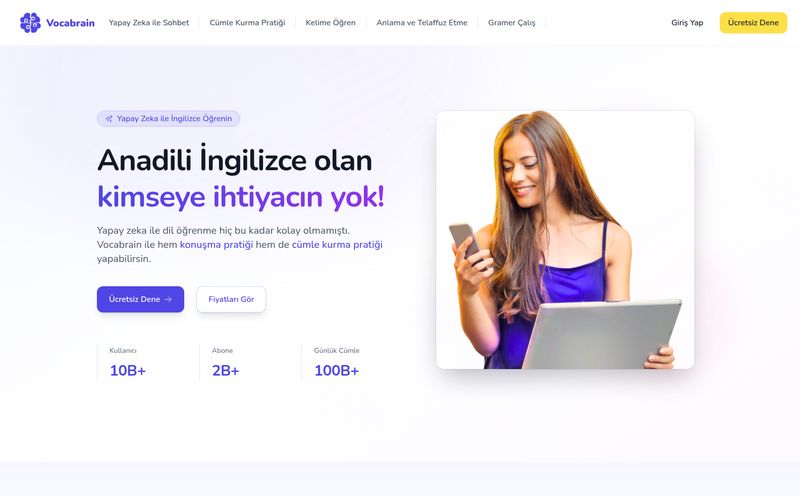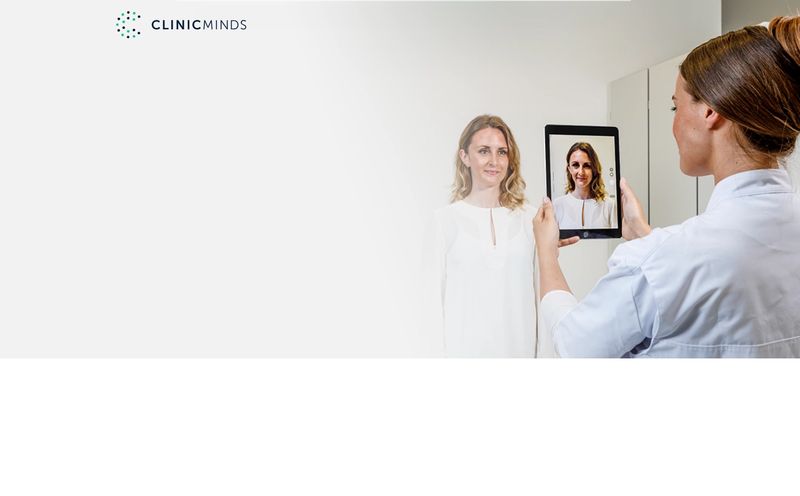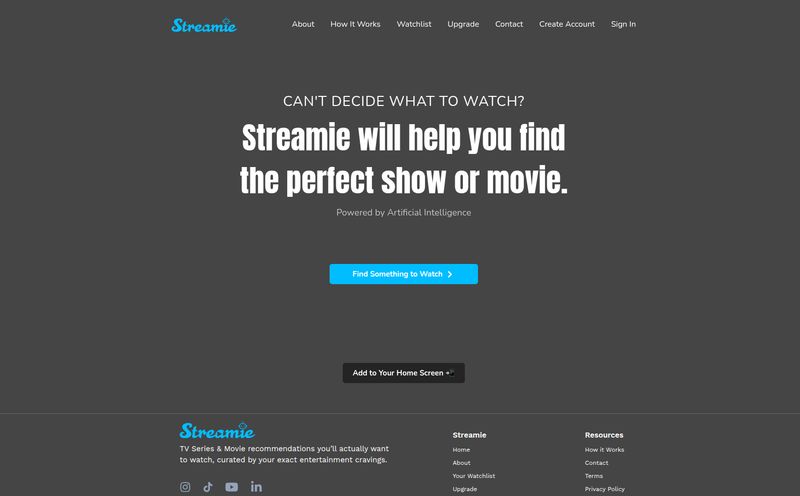As someone who lives and breathes SEO and digital trends, my inbox is a constant flood of “The Next Big Thing.” AI that writes your copy, AI that designs your house, AI that probably knows what I want for dinner before I do. Most of it is just noise. But every now and then, something pops up that makes me lean in a little closer. This time, it was a platform called Infiheal.
It's an AI-powered mental health platform. And my first thought was, of course, a healthy dose of skepticism. We're talking about mental health, not generating ad copy. This is delicate stuff. But my second thought, the SEO-brain thought, was… wow, what a traffic generation strategy. A free, 24/7 AI therapist? That’s a keyword goldmine.
So, I decided to put on both my human hat and my marketing hat to see what Infiheal is all about. Is it a genuinely helpful tool for the masses, or a cleverly packaged lead magnet? Or maybe, just maybe, it can be both.

Visit Infiheal
So, What Exactly Is Infiheal?
At its core, Infiheal is a digital mental wellness hub. It's trying to tackle that massive, thorny problem of mental healthcare being expensive, hard to access, and wrapped up in stigma. The platform is built on two main pillars: on-demand AI support and a streamlined way to connect with actual human therapists.
The star of the show is an AI chatbot named Healo. It's powered by GPT, available 24/7 in over 90 languages (which is wild), and it’s free to chat with. The idea is to give you a space to vent, work through thoughts, or just not feel so alone at 3 a.m. when your brain decides to replay your most embarrassing moment from middle school. We've all been there.
Beyond the bot, it’s a whole ecosystem. Think self-assessment tests, a “Focus Zone” with ambient sounds for productivity, and a booking system to find a licensed therapist that supposedly matches your personality. It's an ambitious all-in-one approach.
Healo: Your 24/7 AI Pocket Therapist (Or Is It?)
I’ve had my fair share of conversations with AI. Some feel like talking to a brick wall that's learned to say “I understand your frustration.” Others are surprisingly… insightful. I spent some time chatting with Healo, and I have to say, it’s one of the better ones. It’s not just spitting out generic affirmations. It asks follow-up questions, it can guide you through simple CBT-style exercises, and it’s surprisingly patient. You can't really shock it or feel like you're burdening it, which I can see being a huge plus for a lot of people.
The Good, The Bad, and The AI
Let's not kid ourselves, an AI is not a substitute for a human therapist, especially for serious conditions. Infiheal seems to know this, positioning Healo as a support tool, not a cure. The biggest pro is accessibility. It's immediate, it's free, and it's private. That alone could be a game-changer for someone who’s hesitant to take the first step. But it’s a double-edged sword. The effectiveness is going to vary wildly from person to person. For some, it might be a lifeline. For others, it might feel impersonal and fall short when true empathy and nuanced understanding are needed. It’s a tool, and like any tool, its usefulness depends on the job and the person using it.
"The greatest discovery of my generation is that a human being can alter his life by altering his attitudes." – William James
This quote feels relevant here. Tools like Healo are, at their best, attitude-altering instruments. They provide a new way to interact with our own thoughts.
More Than Just a Chatbot: The Full Feature Set
Okay, so the AI is the flashy headline. But what else is in the box? I was pretty impressed by the breadth of the other features, which shows they're thinking about user retention, not just initial acquisition.
Finding a Human Therapist
This is the other half of the equation. When the AI isn't enough, Infiheal has a directory of licensed professionals. Their angle is “personality-based matching.” You take a test, and their algorithm suggests therapists who might be a good fit. I'm a little cynical about how deep this matching goes—it's likely based on pretty broad strokes—but anything that reduces the overwhelming 'shopping around' phase for a therapist is a step in the right direction. It makes the process feel less like a shot in the dark.
Self-Care Tools and Other Goodies
This part is pretty robust. They offer a bunch of self-tests for things like anxiety and depression (standard disclaimers apply: not a diagnosis!). They also have a library of worksheets for reflection, a 'Focus Zone' with curated music and sounds for concentration or relaxation, and a community forum. From an engagement perspective, this is smart. It gives users a reason to open the app every day, even if they aren't in crisis mode. It turns the platform from an emergency service into a daily wellness companion.
The All-Important Question: What's the Cost?
Chatting with Healo the AI is free, which is their big hook. But for the premium features—like unlimited self-tests, downloadable tools, and access to the full music library—there's a subscription. The pricing is… interesting. It's clearly targeted at the Indian market, listed in Rupees (₹), and it's incredibly aggressive.
Here’s a quick breakdown of their premium plans, but always check their official pricing page for the latest info:
| Plan Name | Cost | Key Features |
|---|---|---|
| Lite | ₹59 (discounted from ₹799) for 1 week | Community access, 20 downloadable tools, 10 self-tests. |
| GOLD | ₹139 (discounted from ₹479) for 2 months | Everything in Lite, plus unlimited tools and 25 self-tests. |
| Plus | ₹249 (discounted from ₹879) for 3 months | Everything in Gold, but with 40 self-tests. |
The pricing is so low it feels like a no-brainer for someone on the fence. And that, my friends, is a classic user acquisition strategy. Lower the barrier to entry so much that people can't help but give it a try.
An SEO's Perspective: Why Infiheal is a Case Study in Traffic
Putting my marketing hat back on, this thing is brilliantly designed for search visibility. They are tapping into a massive well of high-intent, long-tail keywords. Think about the queries:
talk to someone now for free
am i depressed test
how to deal with anxiety at night
affordable therapy online
The free AI therapist directly answers the first query. The self-tests target the second. The worksheets and tools target the third. The therapist directory targets the fourth. By offering a free, multilingual AI, they've created an incredible top-of-funnel tool that draws in a huge, diverse audience. They capture the user, provide immediate value, and then gently upsell them into a very affordable premium plan or a higher-ticket therapy session. It's a textbook example of a content-driven, freemium model executed perfectly for a specific niche.
My Final Take: Is Infiheal Worth a Look?
So, after all that, what's the verdict? I'm cautiously optimistic. I went in expecting a gimmick and found a surprisingly well-thought-out platform. Infiheal is not a replacement for professional mental healthcare. Let's get that straight. But it was never designed to be.
Instead, it’s a bridge. It’s a first step. It's a digital 'someone' to talk to when human options are out of reach. For the price of a cup of coffee, you get access to a suite of tools that could genuinely help you manage daily stress and build better mental habits. As a gateway to making mental health support more mainstream and less intimidating, I think it's fantastic. The tech is solid, the strategy is smart, and the mission is a good one. Just go in with the right expectations, and you might be pleasantly surprised.
Frequently Asked Questions
- 1. What exactly is Infiheal?
- Infiheal is a mental wellness platform that offers a free AI-powered therapist named Healo for 24/7 support, as well as a directory to book sessions with licensed human therapists. It also includes self-care tools, tests, and community features.
- 2. Is the AI therapist really free to use?
- Yes, chatting with the AI therapist, Healo, is free. Some of the platform's other features, like an extensive library of downloadable tools and self-tests, require a premium subscription.
- 3. Can Infiheal's AI replace a real therapist?
- No. The AI is designed as a supportive tool for daily check-ins, venting, or learning basic coping mechanisms. It is not a substitute for professional diagnosis or treatment from a qualified human therapist, especially for complex mental health conditions.
- 4. Is my data and conversation with the AI private?
- Platforms like Infiheal typically prioritize user privacy and employ encryption. However, it's always best practice to review the platform's specific privacy policy to understand how your data is handled and stored before sharing sensitive personal information.
- 5. How does the therapist matching work?
- Infiheal uses a personality-based assessment to suggest therapists from its network who might be a good fit for your communication style and needs. This aims to simplify the process of finding a compatible therapist.
Conclusion
The intersection of AI and mental health is going to be a fascinating, and probably bumpy, road. There are real ethical questions to consider. But I can't deny the power of making support more accessible. Infiheal is a compelling player in this new space. It's leveraging technology not just for the sake of it, but to solve a real human problem: the need for a listening ear. And from a business and marketing standpoint, they're doing a lot of things right. It’s a platform I’ll definitely be keeping an eye on.



